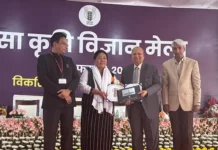NEW DELHI, 15 Feb: In a landmark verdict just months ahead of the Lok Sabha polls, the Supreme Court on Thursday scrapped the Centre’s electoral bonds scheme of anonymous political funding, calling it “unconstitutional” and ordering disclosure of the bond’s donors, amount and recipients by 13 March.
Holding that the 2018 scheme was “violative” of the constitutional right to freedom of speech and expression and right to information, a five-judge Constitution bench headed by Chief Justice DY Chandrachud also rejected the Centre’s contention that it was meant to bring about transparency and curb black money in political funding.
The verdict is being seen as a blow to the Modi government.
Ordering closure of the controversial scheme forthwith, the top court also directed the State Bank of India (SBI), the authorised financial institution under the scheme, to submit by 6 March the details of electoral bonds purchased since 12 April, 2019 till date to the Election Commission of India (ECI), which will publish the information on its official website by 13 March.
It ordered that un-cashed electoral bonds, which are within the validity period of 15 days, shall be returned by the political party or the purchaser to the issuing bank, which, in turn, shall refund the amount to the purchaser’s account.
“At a primary level, political contributions give a ‘seat at the table’ to the contributor. That is, it enhances access to legislators. This access also translates into influence over policy-making,” said the bench, also comprising Justices Sanjiv Khanna, BR Gavai, JB Pardiwala and Manoj Misra.
“An economically affluent person has a higher ability to make financial contributions to political parties, and there is a legitimate possibility that financial contribution to a political party would lead to quid pro quo arrangements because of the close nexus between money and politics,” the top court said, delivering its two separate but unanimous verdicts cumulatively spanning 232 pages.
“Transparency and not secrecy is the cure and antidote,” said Justice Sanjiv Khanna in his separate and concurring verdict.
The top court also accorded primacy to the right to know of voters over the privacy claims of donors, saying it is “paramount” for free and fair election and democracy.
The judgment referred to the annual audit reports of political parties from 2017-’18 to 2022-’23 which showed party-wise donations received through electoral bonds. Of the Rs 12,000 crore, the BJP received Rs 6,566.11 crore during this period, while the Congress got Rs 1,123.3 crore, according to the reports. The TMC received in its kitty Rs 1,092.98 crore in the same period.
The judgment was pronounced on a batch of petitions, including those filed by Congress leader Jaya Thakur, the Communist Party of India (Marxist) and NGO Association for Democratic Reforms (ADR), challenging the bond scheme.
Democracy does not begin and end with elections and the integrity of election process is pivotal for sustaining the democratic form of government, it said.
Holding that the electoral bonds scheme is not foolproof, the court said that information about funds received by a political party is essential for the voters to exercise their freedom to vote effectively.
Leaders of several opposition parties hailed the verdict, terming it an important step in ensuring transparency in electoral funding.
The Congress said that it will reinforce the power of votes over notes, with party president Mallikarjun Kharge expressing hope that the Modi government would stop resorting to such “mischievous ideas” in the future.
The BJP, however, sought to downplay the verdict, saying that every decision of the apex court should be respected, and accused the opposition parties of politicising the issue, “as they do not have any alternative to Prime Minister Narendra Modi’s leadership.” (PTI)




